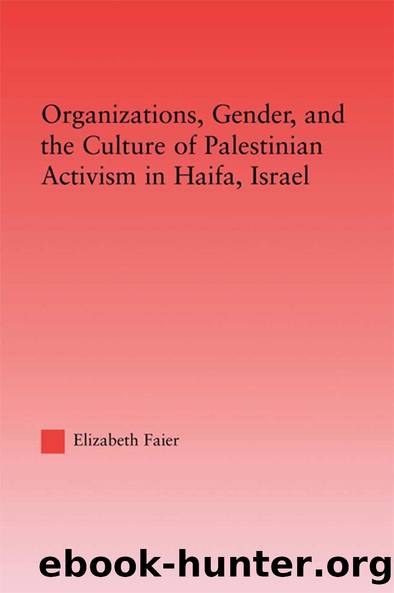Organizations, Gender and the Culture of Palestinian Activism in Haifa, Israel by Elizabeth Faier

Author:Elizabeth Faier [Faier, Elizabeth]
Language: eng
Format: epub
Tags: History, General, Middle East, Political Science, Social Science, Regional Studies
ISBN: 9781135411237
Google: SYndAAAAQBAJ
Publisher: Routledge
Published: 2013-09-13T03:36:24+00:00
Chapter Six
Honor, Land, and Protest
When you lose your land, and you lose your job . . . But, you still have to be good and proud to other people. And from this, how will the child learn more than this? About being Palestinian? How will the child learn about our honor? [Sylvia]
In Israel, the struggle over place and land is of utmost importance to both Jews and Palestinians (Ben-Ari and Bilu 1997; Rabinowitz 1997b). Each âimagined communityâ (Anderson 1991) considers land the vital link between nation and place, constructing it within nationalist ideologies as a ânaturalâ historical fact. In practice, Jews and Palestinians use this place-people association to shape national memory, historiography, and expressions of identity, but through different metaphors of land. As Boyarin argues, the politics of memory, especially concerning space, is â . . . a rhetoric about the past mobilized for political purposesâ (1994:2).
Scholars of Jewish nationalism articulate the pivotal role âthe chosen land destined for the chosen peopleâ plays in Zionism (Schweid 1979:29), and accordingly, Israel's need to control territoriality and resources (Kimmerling 1983; Sachar 1996). For Jews, Eretz Yisrael, or âthe land of Israel,â has âa whole evangelic historyâ (Halbwachs 1980:155) written into the land, evoking Biblical references to the Israelite nation and figuring Israel as both homeland and âHoly Land.â Inherent to this idea of Eretz Yisrael is the geographical and genealogical continuity of the Jewish nation on the land that is now Israel (see Benvenisti 2000 on geography, history, and land; Halbwachs 1980 on continuity and Jewish collective memory; Shryock 1997 on oral history, writing, and national genealogy in Jordan). In Zionist understandings of Eretz Yisrael, land is a metaphor for the cosmology of the nation, and thereby the nation-state.
When Palestinians speak of land, they do so in two ways: as a concrete resourceâthe actual landâand as a metaphor for articulating social, political, national, and personal identities. One activist explained: âWe are connected to the land, it is us, it is how we live.â In explaining the affinity between land and the Palestinian nation, Palestinians often recite the proverb al Ard mithl al âIrD, or âthe land is (like) honor.â Activists told me that even if Jews physically displace Palestinians from the land, they could never ideologically separate Palestinians from it because the land is âessentially Palestinian.â Moreover, through ideas of land and metaphors of rootedness, Palestinians assert national honor and national place. Several activists explained that Palestinians embody the land through women's namesâFalestine, Jaffa, Haifa, Ghaza, which are also place names of Palestine; women figuratively give birth to the nation as place and people. Palestinians also assert the centrality of the land in constructions of home in expressive arts. For example, Palestinian women embroider maps of Palestine, marking out Palestinian communities but not Jewish ones; children sing songs about the Palestinian homecoming when the Jews leave; poets use powerful imagery of past places and sarcastic evaluations of Jewish life in poems about love and land; and Palestinians narrate theirs and othersâ stories of loss.
Download
This site does not store any files on its server. We only index and link to content provided by other sites. Please contact the content providers to delete copyright contents if any and email us, we'll remove relevant links or contents immediately.
The European Opportunity by Felipe Fernández-Armesto(568)
The European History Highway: A Guide to Internet Resources by Dennis A. Trinkle Scott A. Merriman(534)
Morgan Kaufmann Digital Watermarking and Steganography by Ingemar Cox Matthew Miller Jeffrey Bloom Jessica Fridrich Ton(528)
The Seven Wonders of the Ancient World by Michael Denis Higgins(518)
Hyperculture by Byung-Chul Han(504)
European Security in a Global Context by Thierry Tardy(504)
European Security without the Soviet Union by Stuart Croft Phil Williams(501)
The Routledge companion to Christian ethics by D. Stephen Long Rebekah L. Miles(496)
Get Real with Storytime by Julie Dietzel-Glair & Marianne Crandall Follis(443)
Hudud Al-'Alam 'The Regions of the World' - a Persian Geography 372 A.H. (982 AD) by V. V. Minorsky & C. E. Bosworth(436)
Gorbachev And His Generals by William C. Green(427)
Tibetan Studies in Comparative Perspective by Chih-yu Shih Yu-Wen Chen(426)
Governance, Growth and Global Leadership by Espen Moe(417)
How Languages Are Learned 5th Edition by Patsy M Lightbown;Nina Spada; & Nina Spada(406)
CliffsNotes on Fitzgerald's The Great Gatsby by Kate Maurer(398)
The Oxford History of the World by Fernández-Armesto Felipe;(388)
The Egyptian Economy, 1952-2000 by Khalid Ikram(376)
Oral Poetry and Narratives from Central Arabia: The Poetry of Ad-Dindan : A Bedouin Bard in Southern Najd (Studies in Arabic Literature, Vol 17) (English and Arabic Edition) by P. M. Kupershoek P. Marcel Kurpershoek(365)
The Oxford Handbook of the Incas by Sonia Alconini(364)
